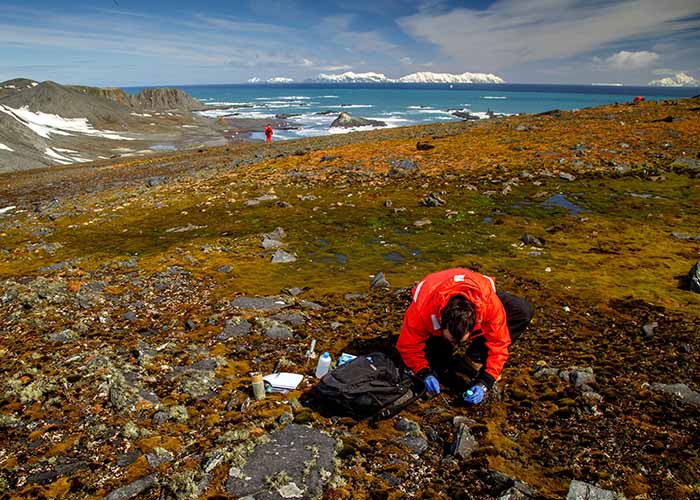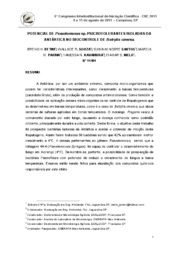Bacteria from Antarctica produce anticancer substances
Bacteria from Antarctica produce anticancer substances
Bacteria that live around the roots of a grass species that only occurs in Antarctica has presented anticancer action. Such action was proven by the biologist Leonardo José da Silva's PhD work, advised by Embrapa Environment (Jaguariúna, SP) Itamar Soares de Melo. In the thesis he defended in August at the University of São Paulo (USP), Silva studied the plant Deschampsia antarctica, from which he extracted microorganisms that live in its rhizosphere (root region).
Scientists selected a group of bacteria associated to this grass, the actinobacteria, which are known for producing a range of bioactive substances and have proven potential to generate antitumor products. Out of this material, Silva identified and characterized the compounds responsible for the antitumor activity and assessed the taxonomic identity (classification) of some strains for the description of possibly new actinobacteria species.
These microorganisms also present the potential to inhibit and control the plant pathogen Agrobacterium, which is responsible for the formation of plant tumors and has caused severe damage to several agriculturally important crops. Agrobacterium control has been very difficult and actinobacteria are capable of producing antibiotics for use in agriculture. Moreover, the same bacteria have presented strong activity against the Pythium aphanidermatum fungus, an important agent of diseases in agricultural plants.
Adverse environments generate interesting molecules
There are only two species of vascular plants naturally found in Antarctica: Deschampsia antarctica and Colobanthus quitensis, popularly known as Antarctic hair grass and Antarctic pearlwort, respectively. Silva reports that several research groups aim at deciphering the adaptative processes of such plant species, as well as exploring the biotechnological potential related to plant survival in adverse conditions. D. antarctica forms small ice crystals on the surface of its leaves under extreme cold weather and presents strong tolerance to ultraviolet radiation.
It is estimated that about 50% of the anticancer agents currently in use stem from plants and microorganisms, and actinobacteria stand out among them due to their metabolic versatility and production of compounds with bactericidal, fungicidal, algicidal and anticancer activity. Most pharmaceuticals present activity against the proliferation of tumoral cells, and recent approaches attempted to select specific bioactive agents to inhibit the vascularization of tumoral tissue, that is, they affect the blood supply of sick cells. In search of alternatives, scientists have sought new microbial resources in untouched habitats, especially in extreme environments, the extreme environments, that generally produce rare substances.
The samples were collected during the 33rd Antarctic Operation. At the time, in December 2014, few areas with ice-free soil were found. The period was chosen because it is the time plant species sprout and biological activity increase in the region.
According to Silva, 30 strains of actinobacteria of bioactive substances were selected for their antitumoral substance production. The PhD candidate identified and characterized compounds responsible for the antitumoral activity and assessed the taxonomic identity (classification) of all the lineages through DNA sequencing and other methods. He demonstrated that most of this diversity is formed by new species, and it includes the newly-described Rhodococcus psychrotolerans sp. nov. Other new species of the genera Nocardia and Streptomyces were found.
Bacteria inhibit tumor growth
A strain identified as Streptomyces sp. CMAA 1527 presented strong activity against the proliferation of cancer cells in lab conditions for breast, lung, kidney and central nervous system tumors. One of the chemical substances identified as responsible for those effects is cinerubin B.
CMAA 1527 completely inhibited the growth of lineages of tumor cells, presenting higher effect on the lineages of cancer cells called MCF-7. In addition, it also presented antitumoral effects in other types of cells, such as the HaCaT lineage, which is evidence of great potential to be used in other types of malignant tumors.
After the tests, some actinobacteria were considered promising for the production of antitumoral compounds, and will now undergo antiproliferative trials and have their active agents responsible for inhibition properties characterized.
The research has kept working with trials to discover new bacteria in Antarctica andstudies on the action mechanisms of the compounds they produce. The scientists have also been cataloguing actinobacterias that had been hitherto unknown by science.
The lineages used in the work were ceded by the United States National Cancer Institute (NCI) and the human keratinocyte HaCaT (non tumoral) cell line, by professor Ricardo Della Coletta, from the Campinas State University (Unicamp) College of Odontology in Piracicaba, SP, Brazil.Supervised by the Embrapa researcher Itamar Soares de Melo, the research was developed in the scope of projects coordinated by the professor from USP's Oceanographical Institute Vivian Helena Pellizari and by the professor from the Minas Gerais Federal University (UFMG) Luiz Henrique Rosa. Other participants include the USP professors Luiz Alberto Moraes and Ana Lúcia Tasca Ruiz, and Valéria Maia de Oliveira, from Unicamp.
Translation: Mariana Medeiros
Cristina Tordin (MTb 28.499/SP)
Embrapa Environment
Press inquiries
meio-ambiente.imprensa@embrapa.br
Phone number: +55 61 19 3311 2608
Further information on the topic
Citizen Attention Service (SAC)
www.embrapa.br/contact-us/sac/



